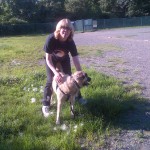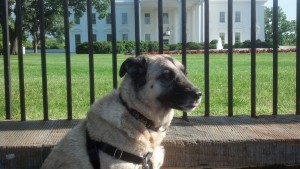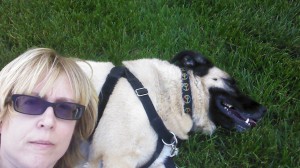 P. M. Korkinsky lives with a large dog of indeterminate heritage in a small apartment in DC. Both poet and dog spend many hours wandering the city in search of words. When not writing poetry, Korkinsky blogs at www.zendogjourney.com about dogs that suffer from separation anxiety. Late Night Jazz, a collection of experimental prose poetry, is being indie published by iUniverse and will be available in 2014. An excerpt of Late Night Jazz will appear in Defying Gravity, the sixth volume in Paycock Press’s Grace & Gravity series (Nov. ’13).
P. M. Korkinsky lives with a large dog of indeterminate heritage in a small apartment in DC. Both poet and dog spend many hours wandering the city in search of words. When not writing poetry, Korkinsky blogs at www.zendogjourney.com about dogs that suffer from separation anxiety. Late Night Jazz, a collection of experimental prose poetry, is being indie published by iUniverse and will be available in 2014. An excerpt of Late Night Jazz will appear in Defying Gravity, the sixth volume in Paycock Press’s Grace & Gravity series (Nov. ’13).

p.m. korkinsky: The writing life is different for everyone. The poet, the literary novelist, the crime writer. We come to it differently. We are affected by it differently. For me, as a poet, I find life fragmented and lyrical. I wake at 2 am and listen to DC, the city of Washington. Without the traffic, the mentally ill homeless, the street musicians, the city in transition, I don’t know if I’d have anything to say.
I find DC speaks in blended mouths. I hear the bucket drummers pounding out the beat. I see clocks in towers and write poetry about metronomes. I see stray cats around the construction near the art gallery on 7th Street. I want to save them. I want them to save me. We are the poetry of inter-connectedness. And yet, we are alone in our thoughts.
I grew up listening to alternative and grunge music, and it affected my writing. Alternative music reflected my early reality. Distorted, loud, trying to break through the meaninglessness of the culture of the 1980s. I’m not sure whether it was a positive or negative influence. But it was an influence.
Later, music by R.E.M. and the Counting Crows started to influence my work, and music has continued to influence it. I play guitar and a little keyboard and alto saxophone. I like the less heard of folk singers like Dave Hardin and Sam Shaber. The lyrics are immensely poetic. In the past five years or so, I’ve been influenced more by jazz, which is solitary in a way–sound isolated from words. Coltrane especially can take the listener to a spiritual place. A piece of music can change my mind. So can a few lines of poetry. I find the power of music very daunting when trying to create my own work.
"She sits on the bed and looks at the game on the table. Own world. Still the leftover sounds of moving pieces pawning the king into the streets."
Even though for me writing is about escaping the inescapable, I draw from nonfiction. I’ve been reading a biography of Paul Celan for the past two months. I like to take the time to reflect. I find really old interviews on YouTube on just about any artist–writer, poet, musician, designer, artist. We have so much at our fingertips now. To go on the Internet and see Coltrane talking about jazz in the early 1960s–that’s inspiring.
I also draw on graphic and web designers. Artists of all types. I like the graphic designer Milton Glaser’s belief that art should be in everybody’s everyday life. It should not be a separate experience. Graphic design, music, art, and poetry surround us.
I like meditation as a conceptual framework for creating. Walking my shepherd mindfully through the streets of DC at midnight is beautiful. I try to bring these images, reflections, sounds into my work. The soul of the city exposed at night is stylistically different than during the day.
I like exploring art in different venues. Some people can sit in a coffee shop and listen to someone drumming their fingers and get annoyed. I let that rhythm shift into the space of my poetry. And I never know when it might happen; it’s unpredictable, too.
I like typography. A poem written in Helvetica is different than a poem written in Futura or Comic Sans or something Gothic. I don’t know if writers think about this or not. Or if perhaps I over think it. But I like writing in different fonts as a way of finding something new in the poem.
I never sought out publishing in my younger days. Making a living, paying bills, all of that, was too important. I don’t regret it; after all, not living on the streets is a good thing. But with newer technology, I’m finding opportunities to combine art (graphic design, web content, poetry, and coding) and spending more time with art. I think technology is both a good thing and a bad thing, but mostly good. We are even more interconnected, and we are able to gain access to writing, art, and knowledge.
"Move forward and speak wrong word and back. Sounds in feral dreams."
As we move more and more into this technological world, artists of all types are adapting. And that’s really part of the creative process. I still write poetry in journals, but that’s like sketching a painting first in pencil or charcoal. It’s part of the creative process. The problem lies in being able to find great pieces of writing, great art, and great music on the Internet. I find myself watching a lot of TED (Technology Entertainment, Design) TV on the internet. It’s also on NPR on Science Friday. So Internet meets radio. Being able to hear a writer, artist, or scientist talk about their work is sometimes all it takes to start writing that poem or that article for a blog. This technology is great for inspiration.
My concern with the Internet is that writers who do not have a foundation in writing may have more readers than writers we really should be reading. But I remember the time before the Internet, and we used to ask then the same question–what is great literary art? I think we just need to pay more attention. And that’s okay—being able to focus and discriminate, those are also part of the creative process.
I’m just beginning the process of getting my poetry published. I’ve been writing poetry since I was seven, majored in English in college, but it’s just now, more than 30 years later, that I’m ready to put words out into the world. I’m not sure what will happen. But I do know that art is not publishing and publishing is not art. Everyone has the capability to create. And that’s what the world needs. When we create, we become active. We are more likely to create than destroy. In a world of uncertainty, that’s the most compelling reason to write.

Author Sites:
www.korkinskystudios.com
www.zendogjourney.com